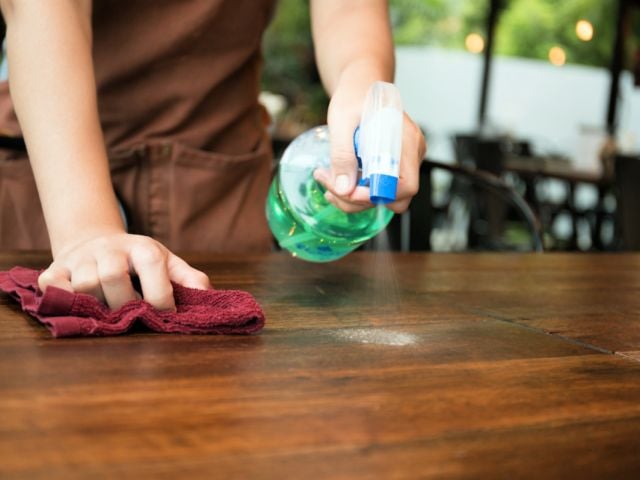
A piece of legislation winding its way through the California legislature could be the biggest influence on U.S. cosmetics safety for close to a century. The bill would ban a dozen of the most concerning ingredients commonly found in cosmetics sold in California.
EWG breaks down why this new legislation is great news, whether you live in California or elsewhere in the U.S.
What is California’s Toxic-Free Cosmetics Act?
The U.S. cosmetics industry is notoriously underregulated. Ingredients that research has shown to be unsafe are legally permitted in the cosmetics sold online, at your local drugstore or department store – or anywhere else in the U.S. Legislation pending in California could change that – not just in the Golden State but in the rest of the U.S., too.
Women and men of all ages, and even children, use products on a daily basis that contain ingredients which can increase the risk of cancer, disrupt the fine-tuned hormonal balance and harm the immune system. Cosmetics companies can legally use these ingredients, and they don’t provide consumers with any information about the potential impacts of certain ingredients on human health.
This may be about to change. The Toxic-Free Cosmetics Act, also called Assembly Bill 2762, is a landmark piece of legislation. If passed, it would for the first time clearly prohibit the sale of cosmetics containing certain toxic ingredients.
The state of play
A.B. 2762 was introduced by Assemblymembers Al Muratsuchi (D-Torrance), Bill Quirk (D-Hayward) and Buffy Wicks (D-Oakland).
The bill passed out of the California Assembly on June 11.
The legislation will now move to the state Senate, where it will be heard by policy and fiscal committees. All bills must be passed out of the California legislature by the end of August.
What would A.B. 2762 do?
If passed into law, A.B. 2762 will prohibit the sale in California of cosmetics that contain any one of 12 highly toxic chemicals. All 12 of these chemicals have already been banned by the European Union from use in cosmetics because of their toxicity and harmful impacts on health such as cancer, birth defects, damage to the reproductive system, organ system toxicity and endocrine disruption.
Ten of the 12 chemicals banned by A.B. 2762 are linked to breast cancer, and nine are linked to a compromised immune system, which can increase susceptibility to, and slow recovery from, illness.
The 12 chemicals banned by AB 2762 are:
- Formaldehyde, a known carcinogen. It harms the skin, lungs and respiratory system as well as the immune system.
- Paraformaldehyde, a type of formaldehyde.
- Methylene glycol, a type of formaldehyde.
- Quaternium-15, which releases formaldehyde, and can cause allergic contact dermatitis.
- Mercury, a potent neurotoxicant especially harmful to children.
- Dibutyl and diethyl hexyl phthalates, which disrupt hormones and harm the reproductive system.
- Isobutyl and isopropyl parabens, which disrupt hormones and harm the reproductive system.
- The family of toxic chemicals known as PFAS, which have been linked to cancer, hormonal disruption, harm to the reproductive system and suppressed immune activity.
- M- and o-phenylenediamine, used in hair dyes, which irritate and sensitize the skin, damage DNA and can cause cancer.
Why is A.B. 2762 so important?
Personal care and beauty products sold in California and the U.S. are largely unregulated. To formulate them, manufacturers can and do use virtually any chemical, including those with known links to cancer, reproductive harm or birth defects.
Neither federal nor state laws require cosmetics manufacturers to test their products before they reach store shelves. Regulatory agencies don’t require companies to show that their products are safe, either. Of more than 10,000 chemicals used to formulate cosmetics, just 11 have ever been banned or restricted by the federal Food and Drug Administration.
By contrast, the EU prohibits or restricts the use of more than 1,400 chemicals in cosmetics, and many other countries closely regulate cosmetics. More than 40 nations have stricter cosmetic safety regulations than the U.S.
But A.B. 2762 affects California only. What about the rest of the U.S.?
According to the California Safe Cosmetics Program, at least 88 different carcinogens and reproductive toxicants are intentionally added to cosmetics sold in California. A state agency also found mercury in 25 percent of skin-lightening creams that were tested for it. Labels show that PFAS as well as hormone disruptors, such as parabens, are commonly present in Californians’ cosmetics.
Men, women and children of all ages regularly use many personal care products and beauty products, and by doing so are regularly exposed to the potentially toxic chemicals they contain. Women on average use up to 12 products each day, and teenagers use as many as 17. Studies show that human bodies absorb the chemicals in these products.
Californians need and deserve the same protection from harmful cosmetics that consumers in the EU and many other countries have.
Who is backing the legislation?
A.B. 2762 has gotten broad support.
In a sign of its significance, the Personal Care Products Council – the trade association for the large cosmetics industry – has put its weight behind the bill.
It is getting critical backing from the assemblymembers who introduced it. In addition, besides EWG, three key advocacy groups also sponsor A.B. 2762: CalPIRG, Breast Cancer Prevention Partners and Black Women for Wellness.
Other backers include public health, environmental, consumer protection, and community and faith-based organizations, as well as public sanitation agencies and green cosmetics companies.
What about cosmetics sold in the rest of the country?
Several proposals pending in Congress would improve the safety of cosmetics sold across the country.
One of them, the Cosmetics Safety Enhancement Act, H.R. 5279, would:
- Require the FDA to review chemicals of concern.
- Require companies to police foreign supply chains.
- Require companies to alert the FDA about risky products.
- Give the FDA the power to stop production and recall risky products.
- Expand ingredient disclosure about fragrance allergens.
This bill was written by Rep. Frank Pallone (D-N.J.), chair of the House Energy and Commerce Committee, and has passed a key House subcommittee. Another proposal, the bipartisan Personal Care Products Safety Act, was introduced by Sens. Dianne Feinstein (D-Calif.) and Susan Collins (R-Maine) and includes many of the same provisions.
California has long been considered a bellwether state, leading the way for the rest of the country in many areas of health and safety. If California were its own country, it would rank as the sixth largest economy in the world. So the state and its consumer market is hugely influential. If a manufacturer is required to satisfy California standards, it will likely adhere to the same high standard with the products it sends to the rest of the country.
UPDATE, June 11: The California Assembly passed the Toxic-Free Cosmetics Act by a bipartisan vote of 54-0.



